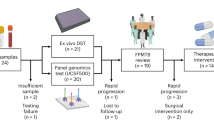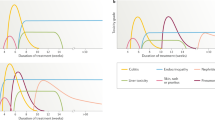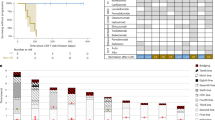Abstract
The treatment of acute myeloid leukemia (AML) is adjusted according to cytogenetic risk factors and molecular markers. Cytarabine remains the main drug to treat AML, and several studies have explored the prognostic relevance of the genotype of cytarabine metabolizing enzymes in AML. Glucuronidation has been identified to be relevant in the cytarabine clearance, but there are still few data concerning the clinical impact of genetic polymorphisms known to condition the activity of UDP-glucuronosyl transferases in AML patients. Here we report the association between the UGT1A1 rs8175347 genotype and the clinical outcome of 455 intermediate-risk cytogenetic AML patients receiving cytarabine-based chemotherapy. Patients with the UGT1A1*28 homozygous variant (associated to a lower UGT1A1 activity) had a lower overall survival (OS) (25.8% vs. 45.5%; p: 0.004). Multivariate analysis confirmed this association (p: 0.008; HR: 1.79; 95% CI: 1.16–2.76). Subgroup analysis showed the negative effect of the UGT1A1*28 homozygous genotype on OS in women (14.8% vs. 52.7%; p: 0.001) but not in men. This lower OS was associated with longer neutropenia after consolidation chemotherapy and with higher mortality without previous relapse, suggesting an association between a low glucuronidation activity and mortal toxic events.
This is a preview of subscription content, access via your institution
Access options
Subscribe to this journal
Receive 12 print issues and online access
$259.00 per year
only $21.58 per issue
Buy this article
- Purchase on Springer Link
- Instant access to full article PDF
Prices may be subject to local taxes which are calculated during checkout




Similar content being viewed by others
References
Boissel N, Cayuela JM, Preudhomme C, Thomas X, Grardel N, Fund X, et al. Prognostic significance of FLT3 internal tandem repeat in patients with de novo acute myeloid leukemia treated with reinforced courses of chemotherapy. Leukemia. 2002;16:1699–704.
Falini B, Mecucci C, Tiacci E, Alcalay M, Rosati R, Pasqualucci L, et al. Cytoplasmic nucleophosmin in acute myelogenous leukemia with a normal karyotype. N Engl J Med. 2005;352:254–66.
Hyo Kim L, Sub Cheong H, Koh Y, Ahn KS, Lee C, Kim HL, et al. Cytidine deaminase polymorphisms and worse treatment response in normal karyotype AML. J Hum Genet. 2015;60:749–54.
Yee SW, Mefford JA, Singh N, Percival ME, Stecula A, Yang K, et al. Impact of polymorphisms in drug pathway genes on disease-free survival in adults with acute myeloid leukemia. J Hum Genet. 2013;58:353–61.
Zahreddine HA, Culjkovic-Kraljacic B, Assouline S, Gendron P, Romeo AA, Morris SJ, et al. The sonic hedgehog factor GLI1 imparts drug resistance through inducible glucuronidation. Nature 2014;511:90–3.
Zahreddine HA, Borden KL. Molecular pathways: GLI1-induced drug glucuronidation in resistant cancer cells. Clin Cancer Res. 2015;21:2207–10.
Zahreddine HA, Culjkovic-Kraljacic B, Gasiorek J, Duchaine J, Borden KLB. GLI1-Inducible glucuronidation targets a broad spectrum of drugs. ACS Chem Biol. 2019;14:348–55.
Guillemette C, Lévesque É, Rouleau M. Pharmacogenomics of human uridine diphospho-glucuronosyltransferases and clinical implications. Clin Pharm Ther. 2014;96:324–39.
Beutler E, Gelbart T, Demina A. Racial variability in the UDP-glucuronosyltransferase 1 (UGT1A1) promoter: a balanced polymorphism for regulation of bilirubin metabolism? Proc Natl Acad Sci USA. 1998;95:8170–4.
Grimwade D, Hills RK, Moorman AV, Walker H, Chatters S, Goldstone AH, et al. Refinement of cytogenetic classification in acute myeloid leukemia: determination of prognostic significance of rare recurring chromosomal abnormalities among 5876 younger adult patients treated in the United Kingdom Medical Research Council trials. Blood. 2010;116:354–65.
Thiede C, Steudel C, Mohr B, Schaich M, Schäkel U, Platzbecker U, et al. Analysis of FLT3-activating mutations in 979 patients with acute myelogenous leukemia: association with FAB subtypes and identification of subgroups with poor prognosis. Blood. 2002;99:4326–35.
Boissel N, Renneville A, Biggio V, Philippe N, Thomas X, Cayuela JM, et al. Prevalence, clinical profile, and prognosis of NPM mutations in AML with normal karyotype. Blood. 2005;106:3618–20.
Fröhling S, Schlenk RF, Stolze I, Bihlmayr J, Benner A, Kreitmeier S, et al. CEBPA mutations in younger adults with acute myeloid leukemia and normal cytogenetics: prognostic relevance and analysis of cooperating mutations. J Clin Oncol. 2004;22:624–33.
Ando Y, Saka H, Ando M, Sawa T, Muro K, Ueoka H, et al. Polymorphisms of UDP-glucuronosyltransferase gene and irinotecan toxicity: a pharmacogenetic analysis. Cancer Res. 2000;60:6921–6.
Innocenti F, Undevia SD, Iyer L, Chen PX, Das S, Kocherginsky M, et al. Genetic variants in the UDP-glucuronosyltransferase 1A1 gene predict the risk of severe neutropenia of irinotecan. J Clin Oncol. 2004;22:1382–8.
de Jong FA, Kehrer DF, Mathijssen RH, Creemers GJ, de Bruijn P, van Schaik RH, et al. Prophylaxis of irinotecan-induced diarrhea with neomycin and potential role for UGT1A1*28 genotype screening: a double-blind, randomized, placebo-controlled study. Oncologist. 2006;11:944–54.
Fleming RA, Capizzi RL, Rosner GL, Oliver LK, Smith SJ, Schiffer CA, et al. Clinical pharmacology of cytarabine in patients with acute myeloid leukemia: a cancer and leukemia group B study. Cancer Chemother Pharm. 1995;36:425–30.
Bosma PJ, Chowdhury JR, Bakker C, Gantla S, de Boer A, Oostra BA, et al. The genetic basis of the reduced expression of bilirubin UDP-glucuronosyltransferase 1 in Gilbert’s syndrome. N Engl J Med. 1995;333:1171–5.
Schwartz JB. The influence of sex on pharmacokinetics. Clin Pharmacokinet. 2003;42:107–21.
Jeong H, Choi S, Song JW, Chen H, Fischer JH. Regulation of UDP-glucuronosyltransferase (UGT) 1A1 by progesterone and its impact on labetalol elimination. Xenobiotica 2008;38:62–75.
Chen P, Zhu KW, Zhang DY, Yan H, Liu H, Liu YL, et al. Influence of UGT1A1 polymorphisms on the outcome of acute myeloid leukemia patients treated with cytarabine-base regimens. J Transl Med. 2018;16:197.
Acknowledgements
This study has been financed in part by grant Oncotrail (Oncolliga Girona) and by grant Llavaneres contra el Càncer.
CETLAM Group
Jorge Sierra, Jordi Esteve, Josep M. Ribera, David Gallardo, Joan Bargay, Olga Salamero, Mar Tormo, Montserrat Arnán, Antònia Sampol, Rosa Coll, Johana Díaz-Santa, Natàlia Lloveras, David Cruz, Carla Moret, Teresa Quiñones, Marina Díaz-Beya, Àlex Bataller, Dolors Costa, María Rozman, Neus Villamor, Francisca Guijarro, Marta Pratcorona, Ana Garrido, Montserrat Hoyos Colell, Marisa Calabuig, Mª Salut Brunet Mauri, Josep F. Nomdedeu, Josep M. Martí-Tutusaus, Ferran Vall.llovera, Marta Canet, Carme Pedro, Leonor Arenillas, Xavier Calvo, Carlos Palacio, Bárbara Tazón, Ester Alonso, Helena Pomares, Susanna Vives, Blanca Xicoy, Lurdes Zamora, Isabel Granada, Marta Cabezón, Francesc Solé, Marcus Buschbeck, Lourdes Escoda, M. Carme Talarn, Marta Cervera, Vicent Castelló, M. Teresa Giménez, Granada Perea, Elena Rámila, M. Luz Muñoz, Marta Gómez, Antoni García-Guiñón, M. Eugènia Rivero, Eva Villamón, Inma Heras, Antonia Cladera, Jordi Martínez, Xavier Ortín, Cristina Motlló.
Author information
Authors and Affiliations
Consortia
Corresponding author
Ethics declarations
Conflict of interest
The authors declare that they have no conflict of interest.
Additional information
Publisher’s note Springer Nature remains neutral with regard to jurisdictional claims in published maps and institutional affiliations.
Members of the CETLAM Group are listed below Acknowledgements
Supplementary information
Rights and permissions
About this article
Cite this article
Díaz-Santa, J., Rodríguez-Romanos, R., Osca, G. et al. UGT1A1 genotype influences clinical outcome in patients with intermediate-risk acute myeloid leukemia treated with cytarabine-based chemotherapy. Leukemia 34, 2925–2933 (2020). https://doi.org/10.1038/s41375-020-0784-2
Received:
Revised:
Accepted:
Published:
Issue Date:
DOI: https://doi.org/10.1038/s41375-020-0784-2



